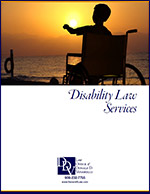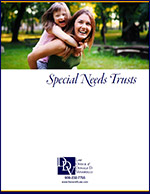NJ Special Needs Trusts and Disability Planning

When parents can no longer care for their special needs children due to disability or death, caregiving responsibility falls on siblings, other family members, and the community. Expenses often increase dramatically when care previously provided by parents must instead be provided by professionals. The New Jersey Law Firm of Donald D. Vanarelli helps families plan for their loved ones with special needs by focusing on special needs trusts and securing available public benefits.
Questions Faced by Parents of Children with Special Needs
- Who will care for my disabled child when I am no longer able to do so?
- Will my own medical needs and the catastrophic costs of long-term care deplete my assets so that little or nothing will be left for my disabled child?
- Can my child maintain eligibility for Supplemental Security Income (SSI), Medicaid, New Jersey community services for the developmentally disabled, housing subsidies and other need-based public benefits after I’ve passed away?
Trust Planning for a Disabled Family Member
Americans are living longer than they did in years past, and the life span of those with disabilities is also increasing. According to one estimate, 480,000 adults with mental and/or emotional disabilities are living with parents who are aged 60 or older. This figure does not include adult children with other disabilities and those who live separately, but still depend on their parents for vital support.
Special needs trust planning by parents can make all the difference in the life of a child with a disability. Planning is also critical for the disabled child’s siblings, who may be left with the responsibility of caring for the disabled sibling (in addition to managing a career and caring for their own families and, possibly, ailing parents).
The Critical Component: A Plan of Care
For a family with a special needs child, the goal of estate planning usually involves providing for the disabled child’s needs without jeopardizing eligibility for needs-based governmental benefits.
Parents may wish to make outright bequests to their children in equal shares. However, this distribution plan may be detrimental to a disabled child. An inheritance could disqualify an adult disabled child from needs-based government assistance. Disqualification for public benefits may also occur if the disabled child is the beneficiary of a life insurance policy or retirement plan, or if the child owns a bank account individually or jointly with another.
A special needs trust is a much safer vehicle for providing funds to a disabled loved one. The properly drafted trust will protect assets from the claims of creditors and preserve the chlld’s eligibility for the needs-based government assistance so vital to the child’s continued well-being.

Special Needs Trusts
Special needs trusts (also known as “supplemental needs” or “supplemental benefits” trusts) allow a disabled beneficiary to receive gifts, lawsuit settlements, inheritances, or other funds, without jeopardizing eligibility for government benefits based upon financial need. Such trusts are drafted so that the funds will not be counted in determining the beneficiary’s eligibility for public benefits. As the name implies, special needs trusts are designed to pay for comforts that could not be paid for by public assistance, as opposed to basic support. These trusts typically pay for goods and services like education, recreation, counseling, and medical attention beyond the basic necessities of life.
“Third party” special needs trusts may be created by a parent or other family member for a disabled child (even though the child may be an adult by the time the trust is created or funded). Such trusts also may be established in a last will and testament, in which a deceased family member to leave assets to a disabled relative.
- Westfield 07090
- Scotch Plains 07076
- Cranford 07016
- Clark 07066
- Springfield 07081
- Union 07083
- Edison 08817
- Berkeley Heights 07922
- Fanwood 07023
- Iselin 08830
- Garwood 07027
- Roselle 07203
- Mountainside 07092
- Elizabeth 07201
- Colonia 07067
- Bridgewater 08807
- New Brunswick 08901
- Plainfield 07060
- North Plainfield 07060
- Highland Park 08904
- Kenilworth 07033
- Linden 07036
- Rahway 07065
- Millburn 07041
- Kearny 07032
- South Plainfield 07080
- Somerville 08876
- Morristown 07960
- Summit 07901
- Piscataway 08854
- Somerset 08873
- Warren 07059
- Watchung 07069
- Wayne 07470
- West Orange 07052
- Whippany 07981
- Woodbridge 07067
- Verona 07044
- Hillside 07205
- Metuchen 08840
- New Providence 07974
In addition, a parent, grandparent, guardian, or a court can create a “self-settled” trust to protect assets that belong to the disabled individual. These self-settled trusts are frequently established for individuals who become disabled as the result of an accident or medical malpractice and later receive the proceeds of a personal injury award or settlement. Each public benefits program has restrictions that the special needs trust must meet so as not to jeopardize the beneficiary’s continued eligibility for public benefits.
The Parents’ Estate Plan
In order for a disability plan involving a special needs trust to be effective, the parents’ estate plan often must be modified. Any inheritance for the disabled child should be left to the special needs trust. Parents also must tell family members who might wish to gift assets during their lives, or leave assets upon their death, that gifts and bequests for the disabled child should be directed to the trust. Beneficiary designations on all life insurance policies, IRAs, retirement accounts, etc. must be changed so that the disabled child does not inherit directly. Instead, the non-probate assets should be directed to the special needs trust.
Plan ahead for your loved one’s care with the assistance of Vanarelli & Li, LLC. As a Certified Elder Law Attorney and NJ Super Lawyer, Donald D. Vanarelli, Esq. has the knowledge, skill and experience necessary to effectively represent you and your loved ones in this complex area of law. Our wide range of service areas allow us to effectively navigate the legal hurdles you face. If you have questions regarding special needs planning and trusts, speak to a member of our team today.
Additional Information
For additional information regarding Special Needs Trusts and Disability Planning, call us at 908-232-7400 or click here to contact us online.









Vanarelli & Li, LLC on Social Media